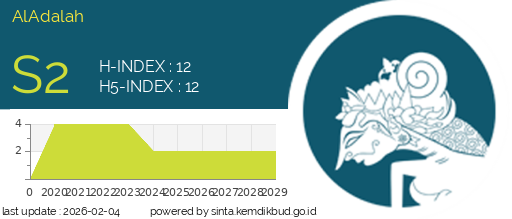The Influence of Muslim Religiosity on Waqf Participation: A Meta-Analysis of Factors and Trends (2014–2024)
DOI:
https://doi.org/10.35719/aladalah.v27i2.514This study analyzes the relationship between religiosity and Muslim participation in waqf through a meta-analysis of 20 studies from 2014–2024. This study is important because although religiosity is considered to influence philanthropy, previous research results have shown significant variations in effects and context. This study fills the gap by evaluating these variations, including regional, cultural, and methodological factors. The study focuses on the extent to which religiosity influences waqf participation. Data were collected from quantitative articles based on Scopus, using JASP software for effect size analysis, heterogeneity, and visualization through forest and funnel plots. The results show a moderate positive effect of religiosity on waqf participation (effect size 0.23) but with high heterogeneity (I² = 96.55%), indicating significant variation between studies. The findings identify contextual factors such as socio-cultural differences, religious practices, and methodological variations as key determinants. The study concludes that waqf promotion strategies must adjust to regional and cultural contexts for greater effectiveness. Recommendations include further cross-cultural research and the development of context-based approaches to reduce heterogeneity. These findings guide policymakers and waqf institutions in designing effective religiosity-based strategies.
Downloads
References
Ajzen, I. (1991). The theory of planned behavior. Organizational Behavior and Human Decision Processes, 50(2), 179–211. https://doi.org/10.1016/0749-5978(91)90020-T
Alifiandy, M. M., & Sukmana, R. (2020). The influence of planned behaviour theory and knowledge towards the waqif intention in contributing waqf. Jurnal Ekonomi dan Bisnis Islam, 6(2), 260–272. https://doi.org/10.20473/jebis.v6i2.22624
Amin, H., Abdul-Rahman, A. R., Ramayah, T., Supinah, R., & Mohd-Aris, M. (2014). Determinants of online waqf acceptance: An empirical investigation. Electronic Journal of Information Systems in Developing Countries, 60(1), 1–18. https://doi.org/10.1002/j.1681-4835.2014.tb00429.x
Amin, I. A., & Al Arif, M. N. R. (2024). The role of trust on investors’ intention to shares waqf in Indonesia. Jurnal Ekonomi & Keuangan Islam, 10(2), 247–262. https://doi.org/10.20885/JEKI.vol10.iss2.art8
Benthall, J. (2016). Islamic philanthropy in Indonesia. In Islamic charities and Islamic humanism in troubled times (pp. 167–194). https://doi.org/10.7228/manchester/9781784993085.003.0009
Berakon, I., Mutmainah, L., Qoyum, A., & Aji, H. M. (2022). Muslim intention to participate in retail CWLS: The test of mediation and moderation effects. Journal of Islamic Monetary Economics and Finance, 8, 17–52. https://doi.org/10.21098/jimf.v8i0.1427
Faturohman, T., Hassandi, I., & Yulianti. (2020). User acceptance of online waqf applications: Evidence from Indonesia. Journal of Islamic Monetary Economics and Finance, 6(3), 503–530. https://doi.org/10.21098/jimf.v6i3.1117
Gustina, W. D. S. (2024). The importance of religiosity, knowledge, and trust for waqif in contributing to cash waqf. International Research Journal of Economics and Management Studies, 3(10), 133–143. https://doi.org/10.56472/25835238/IRJEMS-V3I10P116
Huda, N., Rini, N., Nasution, A. C., Masrizal, M., & Rofi'i, M. (2024). Waqf-based halal tourism development strategy from the aspect of Islamic financial institutions. ZISWAF: Jurnal Zakat dan Wakaf, 11(1). https://doi.org/10.21043/ziswaf.v11i1.25838
Huda, N., Santosa, P. W., & Rini, N. (2022). Factors that influence Muslim employee behavior to contribute to money waqf through salary cutting. Iranian Economic Review, 26(3), 595–610. https://doi.org/10.22059/ier.2021.81548
Isamail, M. Z., Rosele, M. I., & Ramli, M. A. (2015). Pemerkasaan wakaf di Malaysia: Satu sorotan. Labuan E-Journal of Muamalat and Society (LJMS), 9, 1–13. https://doi.org/10.51200/ljms.v9i.2983
Ismail, N., & Maryanti, T. (2022). Determinants of intention to donate on share waqf: The case of Muslim workers in Jakarta. Jurnal Ekonomi dan Bisnis Islam, 8(1), 1–17. https://doi.org/10.20473/jebis.v8i1.28654
Jatmiko, W., Haidlir, B. M., Azizon, A., Laksmono, B. S., & Kasri, R. (2024). Intergenerational analysis of cash waqf behavior: Lessons learned from Indonesia. Journal of Islamic Accounting and Business Research, 15(4), 590–618. https://doi.org/10.1108/JIABR-03-2022-0086
Justine, N. I. B., & Abd Jalil, M. I. (2022). Repeated giving of cash waqf: A case study of Sabah, Malaysia. Journal of Islamic Monetary Economics and Finance, 8, 107–124. https://doi.org/10.21098/jimf.v8i0.1448
Kasri, R. A., & Chaerunnisa, S. R. (2022). The role of knowledge, trust, and religiosity in explaining the online cash waqf amongst Muslim millennials. Journal of Islamic Marketing, 13(6), 1334–1350. https://doi.org/10.1108/JIMA-04-2020-0101
Khaer, R., Firmansyah, A., & Saepul Rohman, P. (2023). Meta-analysis of wakaf-based sharia microfinance institutions. Perisai: Islamic Banking and Finance Journal, 7(2), 237–254. https://doi.org/10.21070/perisai.v7i2.1661
Kitchenham, B., & Charters, S. M. (2007). Guidelines for performing systematic literature reviews in software engineering. Technical Report, Ver. 2.3 EBSE Technical Report. EBSE, 1(January 2007), 1–54. Retrieved from https://legacyfileshare.elsevier.com/promis_misc/525444systematicreviewsguide.pdf.
Laila, N., Ratnasari, R. T., Ismail, S., Mohd Hidzir, P. A., & Mahphoth, M. H. (2023). The intention of small and medium enterprises’ owners to participate in waqf: the case of Malaysia and Indonesia. International Journal of Islamic and Middle Eastern Finance and Management, 16(3), 429–447. https://doi.org/10.1108/IMEFM-01-2022-0014
Laksmono, B. S., Muhammad, B., Kasri, R. A., Azizon, A., & Hartono, D. (2021). Public behaviour on cash waqf: Evidence from Indonesia. JEJAK: Jurnal Ekonomi dan Kebijakan, 14(2). https://scholar.ui.ac.id/en/publications/public-behaviour-on-cash-waqf-evidence-from-indonesia
Latif, A., Lesmana, M., Ahmad, R. A., & Julian, A. (2022). Student contributions in waqf are reviewed through factors of religiosity, knowledge, and financial attitudes. FINANSIA: Jurnal Akuntansi dan Perbankan Syariah, 5(2), 131–142. https://doi.org/10.32332/finansia.v5i2.5394
Lestari, I. P., Pambekti, G. T., & Annisa, A. A. (2023). Cash waqf behavior: Explaining financial consciousness and the moderating role of religiosity. Muslim Business and Economics Review, 2(1). https://doi.org/10.56529/mber.v2i1.155
Masrizal, M., Huda, N., Harahap, A., Trianto, B., & Sabiu, T. T. (2023). Investigating the determinants of cash waqf intention: An insight from Muslims in Indonesia. Journal of Islamic Monetary Economics and Finance, 9(1), 17–38. https://doi.org/10.21098/jimf.v9i1.1607
Maulina, R., Dhewanto, W., & Faturrahman, T. (2023). Behaviour determinants of two Muslims classes towards cash waqf for productive purposes: explanation from Indonesia. Journal of Islamic Accounting and Business Research. https://doi.org/10.1108/JIABR-04-2023-0139
Mukaromah, F., Ridlwan, A. A., & Sopingi, I. (2023). Manajemen fundraising cash waqf perbankan syariah. JIES: Journal of Islamic Economics Studies, 4(2), 83–95. https://doi.org/10.33752/jies.v4i2.5747
Nurhaida, D., Jasfar, F., Ismal, R., & Jayaprawira, A. R. (2023). Investigating institutional investors' behaviors toward cash waqf linked sukuk using DTPB. International Journal of Islamic Economics and Finance, 6(2). https://doi.org/10.18196/ijief.v6i2.16950
Nuryitman, T. R. (2022). Determinants of the intention to participate in waqf: Altruism, trust, and religiosity. Airlangga Journal of Innovation Management, 3(2), 197–211. https://doi.org/10.20473/ajim.v3i1.40261
Osman, A. F., Mohammed, M. O., & Fadzil, A. (2016). Factor influencing cash waqf giving behavior: A revised theory of planned behavior. Journal of Global Business and Social Entrepreneurship (GBSE), 1(2), 12–25. Retrieved from https://www.academia.edu/download/90019545/JurnalMs33-48Amirul.pdf
Quddus, M. F., & Hasib, F. F. (2023). Waqf in history: A systematic literature review based on Web of Science. Ijtimā Iyya: Journal of Muslim Society Research, 8(1), 79–94. https://doi.org/10.24090/ijtimaiyya.v8i1.7052
Ratnasari, R. T., Ismail, S., Mahphoth, M. H., Laila, N., & Hidzir, P. A. M. (2024). Examining the intention to participate in waqf among Malaysian and Indonesia small-medium entrepreneurs. AIP Conference Proceedings, 2799(1), Article 020057. https://doi.org/10.1063/5.0182333
Riani, R., & Fatoni, A. (2022). Waqf on infrastructure: How far has been researched? International Journal of Waqf, 2(2). https://doi.org/10.58968/ijf.v2i2.167
Rizal, H., & Amin, H. (2017). Perceived ihsan, Islamic egalitarianism and Islamic reli-giosity towards charitable giving of cash waqf. Journal of Islamic Marketing, 8(4), 669–685. https://doi.org/10.1108/JIMA-05-2015-0037
Setiyowati, S. W., Slamet, S., & Rofiq, A. (2024). Determinan wakaf tunai di kalangan milenial. Jurnal Ekonomi Modernisasi, 19(3), 206–217. https://doi.org/10.21067/jem.v19i3.9138
Shukor, S. A., Anwar, I. F., Aziz, S. A., & Sabri, H. (2017). Muslim attitude towards participation in cash WAQF: Antecedents and consequences. International Journal of Business and Society, 18(S1), 193–204. Retrieved from https://www.ijbs.unimas.my/images/repository/pdf/Vol18-S1-paper12.pdf
Suhaimi, F. M., Ab Rahman, A., & Marican, S. (2014). The role of share waqf in the socio-economic development of the Muslim community: The Malaysian experience. Humanomics, 30(3), 227–254. https://doi.org/10.1108/H-12-2012-0025
Sulaeman, S. & Ghozali, A. M. (2023). An integrated cash waqf and Islamic crowdfunding model (I-CWCM) for SMEs: Policy implications for the post-Covid-19 pandemic. Review of Islamic Social Finance and Entrepreneurship, 2(2), 157–166. https://doi.org/10.20885/RISFE.vol2.iss2.art5
Usman, H., Mulia, D., Chairy, C., & Widowati, N. (2022). Integrating trust, religiosity and image into technology acceptance model: the case of the Islamic philanthropy in Indonesia. Journal of Islamic Marketing, 13(2), 381–409. https://doi.org/10.1108/JIMA-01-2020-0020
Widiastuti, T., Mawardi, I., Al-Shami, S. A., Atiya, N., Rani, L. N., Robani, A. B., & Al Mustofa, M. U. (2024). Determinant factors for online cash waqf intention among Muslim millennial generation. Journal of Islamic Marketing. Advance online publication. https://doi.org/10.1108/jima-12-2023-0408
Wijaya, H. R., Hati, S. R. H., & Ekaputra, I. A. (2024). The impact of religiosity and financial literacy on financial management behavior and well-being among Indonesian Muslims. Humanities and Social Sciences Communications, 11, 830. https://doi.org/10.1057/s41599-024-03309-6
Downloads
Section
License
Copyright (c) 2024 Moh Agus Nugroho, Suci Larasati, Md Mahfujur Rahman

This work is licensed under a Creative Commons Attribution-NonCommercial 4.0 International License.
This work is licensed under a Attribution-NonCommercial 4.0 International (CC BY-NC 4.0).

























 Al'Adalah licensed under Creative Commons Attribution-NonCommercial 4.0 International License.
Al'Adalah licensed under Creative Commons Attribution-NonCommercial 4.0 International License.